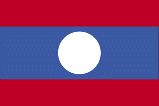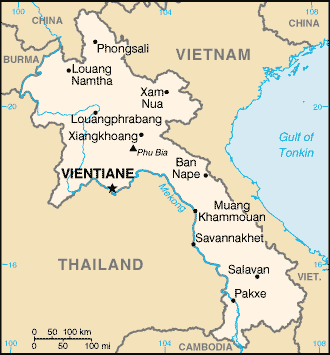|
Laos
|

|
Capital: Vientiane
Population: 7,169,455
Brief History of Laos:
The country of Laos first began to form in 1353 when the Kingdom of Lan Xang took power. The name Lan Xang means ?million elephants?. The ruler was King Fa Ngum and his empire ruled much of Laos as well as Thailand. During this time Buddhism became the primary religion.
In the late 18th century the Lan Xang had collapsed and the Siamese took control of Laos. Then, in the 1800s the French arrived. In 1907 the Franco-Siamese treaty defined the boundaries of current day Laos.
Laos was occupied by the Japanese during World War II. At the end of the war, in 1945, Laos declared independence from France. However, French troops soon reoccupied the country and took control.
In 1954 Laos became an independent country from France. However, war broke out internally. After many years of fighting and intervention from both the United States and the Soviet Union, Laos was ruled by an authoritarian communist party. Many people have fled Laos over the years including the Hmong minority.
The Geography of Laos
Total Size: 236,800 square km
Size Comparison: slightly larger than Utah
Geographical Coordinates: 18 00 N, 105 00 E
World Region or Continent: Southeast Asia
General Terrain: mostly rugged mountains; some plains and plateaus
Geographical Low Point: Mekong River 70 m
Geographical High Point: Phou Bia 2,817 m
Climate: tropical monsoon; rainy season (May to November); dry season (December to April)
Major cities: VIENTIANE (capital) 799,000 (2009)
The People of Laos
Type of Government: Communist state
Languages Spoken: Lao (official), French, English, and various ethnic languages
Independence: 19 July 1949 (from France)
National Holiday: Republic Day, 2 December (1975)
Nationality: Lao(s) or Laotian(s)
Religions: Buddhist 60%, animist and other 40% (including various Christian denominations 1.5%)
National Symbol: elephant
National Anthem or Song: Pheng Xat Lao (Hymn of the Lao People)
Economy of Laos
Major Industries: copper, tin, and gypsum mining; timber, electric power, agricultural processing, construction, garments, tourism, cement
Agricultural Products: sweet potatoes, vegetables, corn, coffee, sugarcane, tobacco, cotton, tea, peanuts, rice; water buffalo, pigs, cattle, poultry
Natural Resources: timber, hydropower, gypsum, tin, gold, gemstones
Major Exports: garments, wood products, coffee, electricity, tin
Major Imports: machinery and equipment, vehicles, fuel, consumer goods
Currency: kip (LAK)
National GDP: $17,410,000,000
** Source for population (2012 est.) and GDP (2011 est.) is CIA World Factbook.
Back to Geography Home Page
